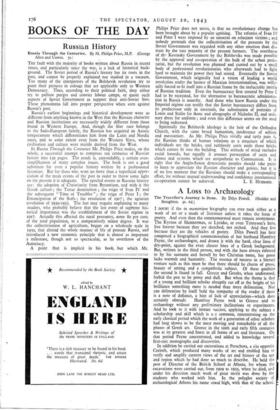BOOKS OF THE DAY
Russian History
Russia Through the Centuries. By M. Philips Price, M.P. (George Allen and Unwin. 55.)
THE fault with the majority of books written about Russia in recent times, and particularly since the war, is a lack of historical back- ground. The Soviet period of Russia's history has its roots ih the past, and cannot be properly explained nor studied in a vacuum. Too many of the interpreters of the Bolshevik revolution try to paint their pictures in colours that are applicable only to Western Democracy. Thus, according to their political faith, they either try to palliate purges and convict labour camps, or quote such aspects of Spviet Government as support their anti-Soviet bias. These phenomena fall into proper perspective when seen against Russia's past.
Russia's earliest beginnings and historical development were so different from anything known in the West that the Russian character and Russian institutions are necessarily widely different from those found in Western Europe. And, though the Slav race belongs to the Indo-European family, the Russian has acquired an Asiatic temperament which differentiates him from the Latin and Nordic races, and to some extent even from the Western Slays, whose civilisation and culture were mainly derived from the West.
In Russia Through the Centuries Mr. Philips Price makes, on the whole, a successful attempt to compress ten centuries of Russian history into 130 pages. The result is, unavoidably, a certain over- simplification of many complex issues. The book is not a good substitute for even a popular history written by a professional historian. But for those who want no more than a superficial appre- ciation of the main events of the past in order to throw some light on the present it is adequate. The epochal events in Russian history are : the adoption of Christianity from Byzantium, and with it the Greek culture ; the Tartar domination ; the reign of Ivan IV and the subsequent " Time of Troubles " ; the reign of Peter I ; the
Emancipation of the Serfs; revolution of 1917 ; the agrarian revolution of 1930-1933. Te last may require explaining to many readers, who probably believe that the last event of supreme his- torical importance was the establishment of the Soviet regime in 1917. Actually this affected the rural peasantry, some 8o per cent. of the total population, to a comparatively minor degree. It was the collectivisation of agriculture, begun on a wholesale scale in 1930, that altered the whole manner of life of peasant Russia, and introduced a new economic principle that is almost as important a milestone, though not so spectacular, as he overthrow of the Autocracy. A point that is implicit in his book, but which Mr. Philips Price does not stress, is that no revolutionary change has been brought about by a popular uprising. The reforms of Ivan IV and Peter I were imposed by an autocrat on reluctant victims ; and nobody pretends that the collectivisation of the peasants by the Soviet Government was regarded with any other emotion than dis- trust by the vast majority of the peasant farmers. The overthrow of tir.: Kerensky Government by the Bolsheviks was made possible by the approval and co-operation of the bulk of the urban prole- tariat, but the revolution was planned and carried out by a small body of professional revolutionaries who afterwards had to fight hard to maintain the power they had seized. Eventually the Soviet Government, which originally had a vision of leading a world revolution under the banner of Marxian internationalism, was willy- nilly forced to fit itself into a Russian frame by the ineluctable inertia of Russian tradition. Even the bureaucracy first created by Peter I had to be recreated, for the alternative to bureaucratic administra- tion in Russia is anarchy. And those who knew Russia under the Imperial regime can testify that the Soviet bureaucracy differs from its predecessor only in externals, the substitution of portraits of Lenin and Stalin for ikons and oleographs of Nicholas II, and ordi- nary dress for uniform ; and even this difference seems on the road to being redressed.
Spiritually the Bolshevik ideology is the heir of the Orthodox Church, with the same broad humanism, intolerance of schism and messianism. As Mr. Philips Price vividly and aptly puts it, the Russian thinks of human relations as a structure of which individuals are the bricks, and ruthlessly casts aside those bricks which cannot fit into the building. This attitude of mind excludes racial hatreds, but equally it arouses persecution of sects and classes and systems which are antipathetic to Communism. It is right that the Anglo-Saxon democratic peoples should take pains to learn to appreciate the Russian character and genius, but it is of no less moment that the Russians should make a corresponding effort, for without mutual understanding and confidence international
co-operation cannot be achieved. L. E. HUBBARD.


























 Previous page
Previous page